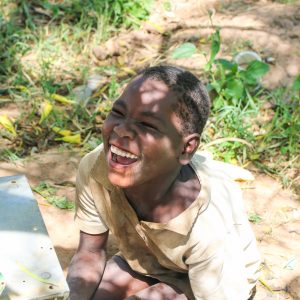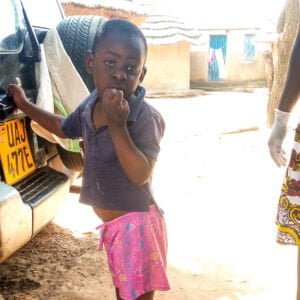The Ark was a pioneering project tackling huge cultural barriers in Soroti, north Uganda. Widespread prejudice against children with disabilities meant they were considered worthless: The last to be fed, the last to be clothed, the last to access education.
In contrast, at The Ark, each child was considered of immense value, and families learnt how to care for their children. This day centre cared for up to 15 children at a time, all of whom had physical disabilities, often mobility issues, of varying degrees of severity. Some, but not all, had learning disabilities as well.
When the team began welcoming *Gentle into The Ark, she had suffered a huge amount. Both her parents had died, and with poor movement in both arms and legs, and no speech, she was very isolated.
Gentle’s aunt was her loving guardian but also provided the main income for the family, so couldn’t always be around to care for Gentle. Other members of the family were not so loving and left Gentle inside a windowless brick shed all day, without food or water.
But, at The Ark, Gentle flourished. She learnt to feed, bathe and dress herself. She learnt to write her name and count. Gentle was able to leave The Ark and settled well in a mainstream school, under the watchful eye of the school matron. The Ark transformed her daily life and her future prospects.
What were the challenges?
Several children attending the day centre were orphans living in extremely large extended families – one lived with an elderly grandparent responsible for 16 dependents, another with 13 cousins. In such large families, all impoverished, it is a struggle to meet even basic needs, let alone the more complex needs of a disabled child.
Before attending The Ark, most of the children led extremely isolated lives, often locked away for hours each day, and suffered discrimination from neighbours, or even family members.
In rural Uganda, services for children with disabilities are extremely limited. Even if a service is offered, many families struggle to access help due to transport difficulties, especially if a child has mobility issues.
Our work
At The Ark, children received healthy meals, training in basic life skills where appropriate, and light physical therapy. Staff developed partnerships with other NGOs and an orthopaedic hospital, and were able to refer children and support them in receiving further treatment when possible. When appropriate, we helped children attend school – although this could be challenging due to cultural attitudes towards disability.
The Ark provided a warm, caring environment for children leading difficult lives – and even with this simple support parents saw changes.
For example, our lead social worker at the centre reported: “*Ivan’s family is happy now because of Global Care’s support to meet his education costs, treatment costs, social support given to the family through the disability group and physiotherapy at the centre, which she testifies has greatly changed his abilities.”
A New Shape for The Ark
During the global COVID-19 pandemic of 2020, The Ark, like all Ugandan education settings, was required to close. Initially, families were supported with emergency relief, enabling them to properly care for their child at home.
*Rebecca was born with physical disabilities that went untreated for two years. Even after her mother reached out for medical support, a lack of access to specialists in the area meant her condition remained officially undiagnosed for a long time.
Rebecca has Downs Syndrome. When she arrived at The Ark aged 4, in April 2019, she could not sit up or carry out any basic tasks and her understanding was very limited. By mid-July, she could stand for 30 minutes with the aid of a walker – and by the beginning of 2020, was learning to crawl. Staff were delighted by her progress, not just in movement but also in her social skills and engagement with the world around her.
Then, coronavirus closed the centre. Rebecca was no longer accessing the expertise of the staff at The Ark – the physiotherapy and sensory play that had brought such rapid progress. How would she fare at home?
Home visits gave the team opportunities to educate Rebecca’s family on physiotherapy exercises for Rebecca, and ways to engage with her in play. Over the months of visiting her in her home, they have seen Rebecca’s continuing development – all in the context of a positive family life. Rebecca is fully supported by her mother and siblings, engaging with them all. She recognises more words, copies their actions such as handwashing and, by the end of 2020, could stand for a few minutes unsupported. For the team, seeing Rebecca flourish within her family was wonderful proof of what at-home support could offer a child with disabilities.
As social restrictions began to lift, it became clear that Ugandan schools were not going to reopen for some time. Instead, the Ark team visited all the children each week, working with them from home and delivering necessary items such as creams, soaps, and nappies.
The team noticed that both the children and families benefitted from this home visit structure. Parents and primary care givers received training in using interactive sensory play techniques, doing physiotherapy exercises with their child and in improving the physical care of the child.
The shift in working practice led to the development of a new disability outreach model for the Soroti community. This was a far more cost-effective way of supporting children with disabilities and at the same time developed the whole family, rather than just the child, with new skills, deeper understanding, and better relationship.
It was clear that there was a new season ahead. Out of the excellent foundation formed by eight years of The Ark day centre, Disability Outreach: Soroti began, reaching far more children with disabilities and their families in their homes.
The Ark Ends Well
The Ark project closed in December 2020, replaced by the new community model. Over its tenure, The Ark supported 32 children, eight of whom went on to access education in mainstream schools. 14 children improved their mobility, communication, and basic life skills sufficiently to leave the programme and remain at home. A grant from the project enabled these families to adapt their home according to their child’s needs, install water points and start businesses providing more stable income, to help them meet the additional costs of caring for a child with disability.
Most significantly, The Ark helped challenge perspectives on disability in Soroti. And the Disability Outreach project continues to develop that cultural shift, as it reaches out to more children with disabilities in the area.
*Children’s names are changed to protect their identities.


 When the team began welcoming *Gentle into The Ark, she had suffered a huge amount. Both her parents had died, and with poor movement in both arms and legs, and no speech, she was very isolated.
When the team began welcoming *Gentle into The Ark, she had suffered a huge amount. Both her parents had died, and with poor movement in both arms and legs, and no speech, she was very isolated. *Rebecca was born with physical disabilities that went untreated for two years. Even after her mother reached out for medical support, a lack of access to specialists in the area meant her condition remained officially undiagnosed for a long time.
*Rebecca was born with physical disabilities that went untreated for two years. Even after her mother reached out for medical support, a lack of access to specialists in the area meant her condition remained officially undiagnosed for a long time.